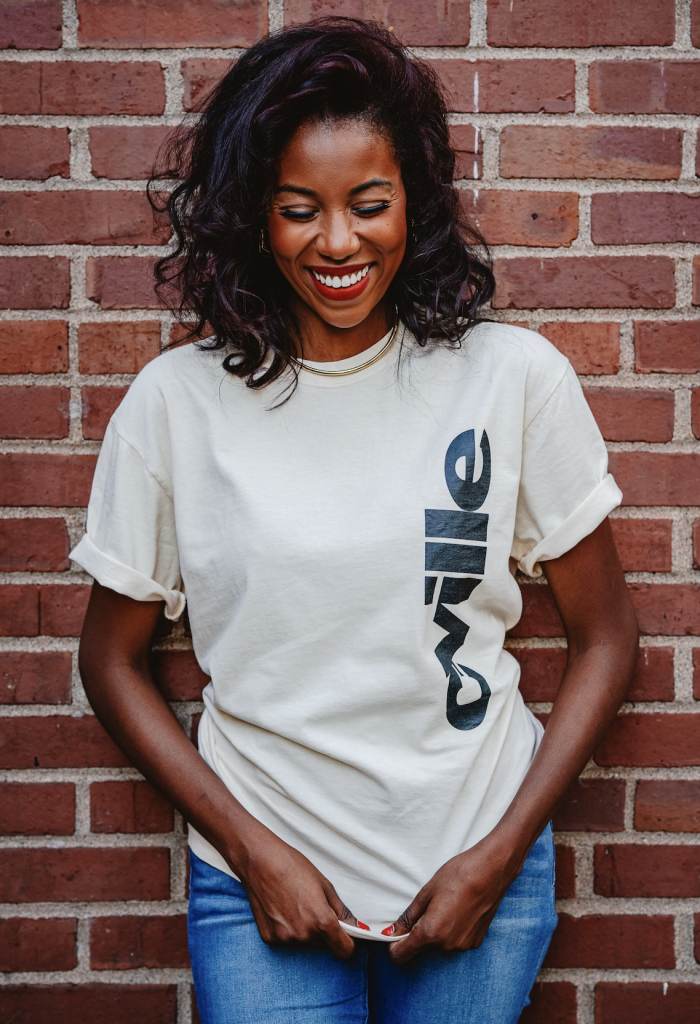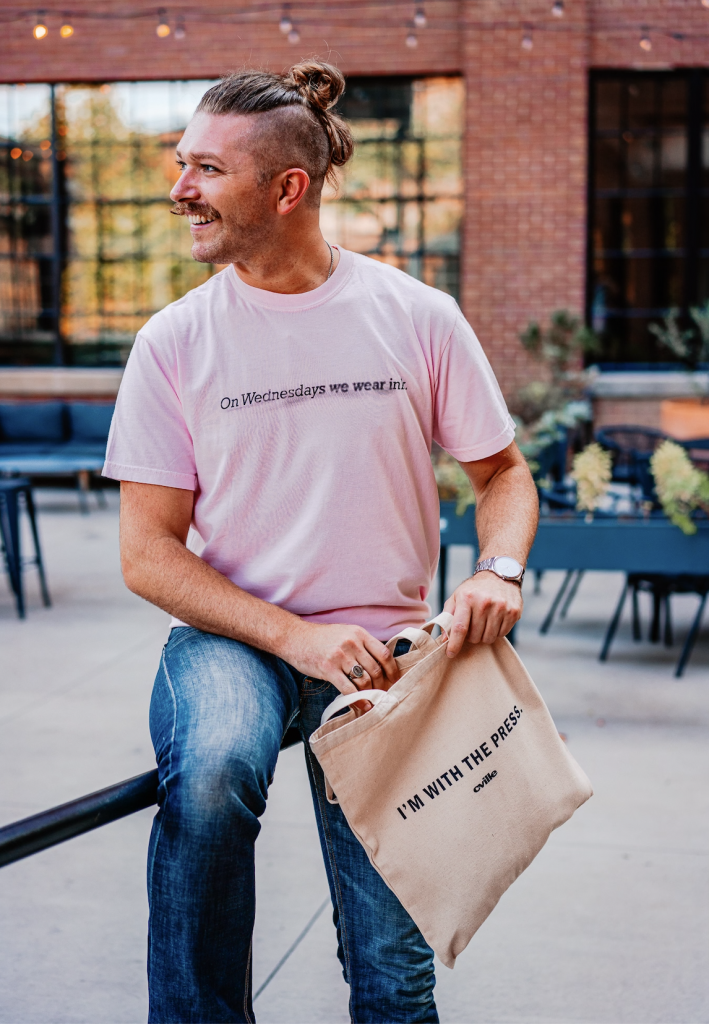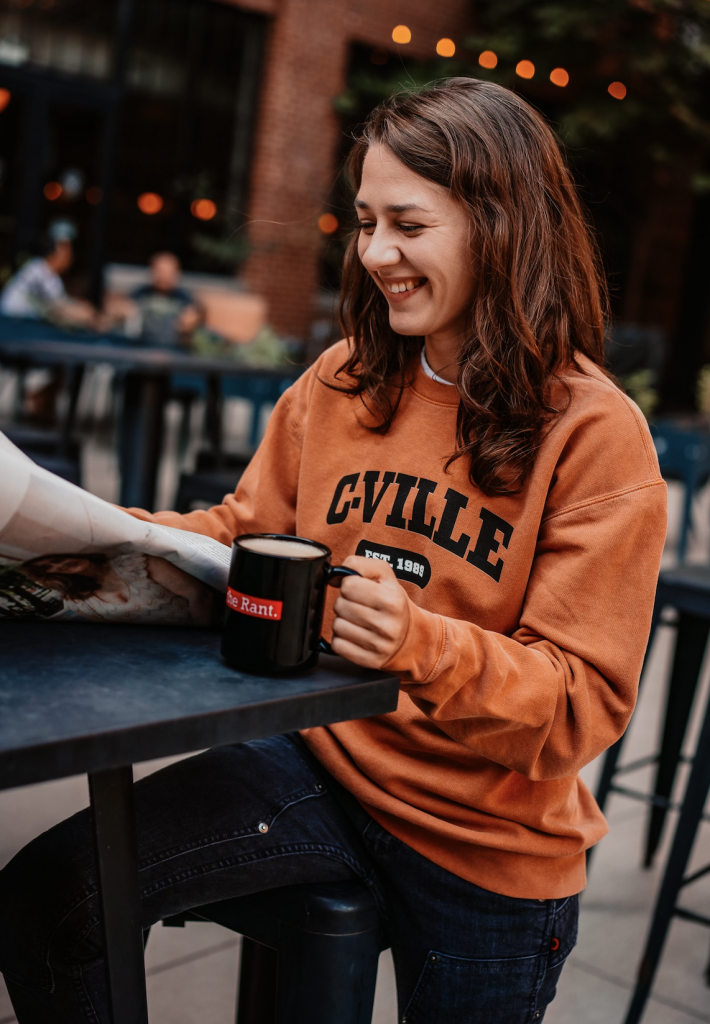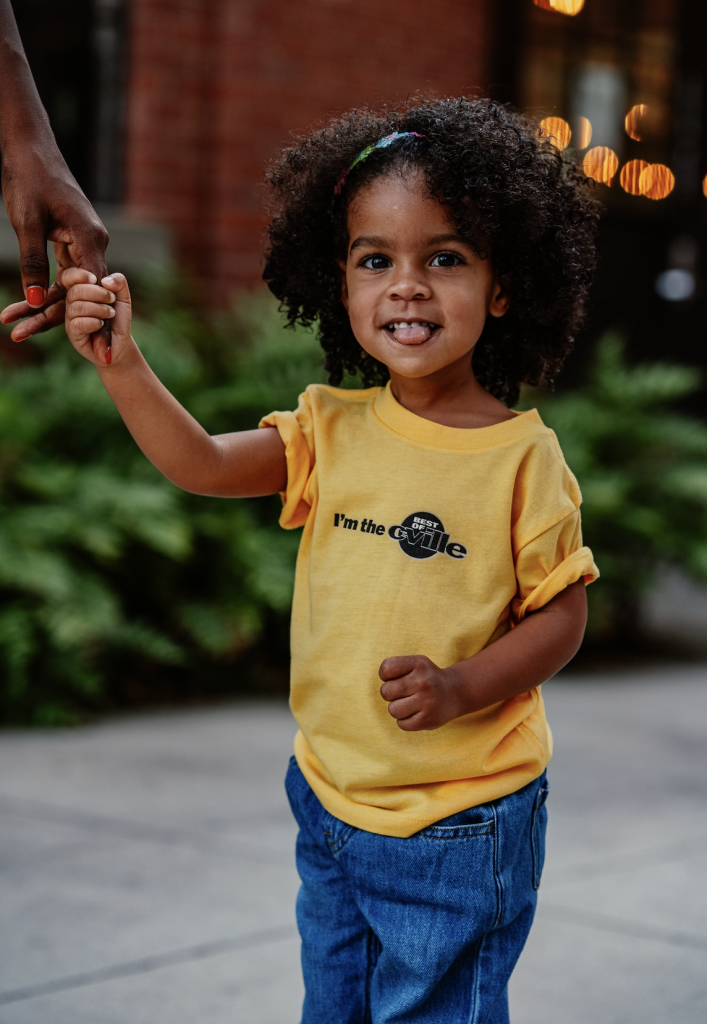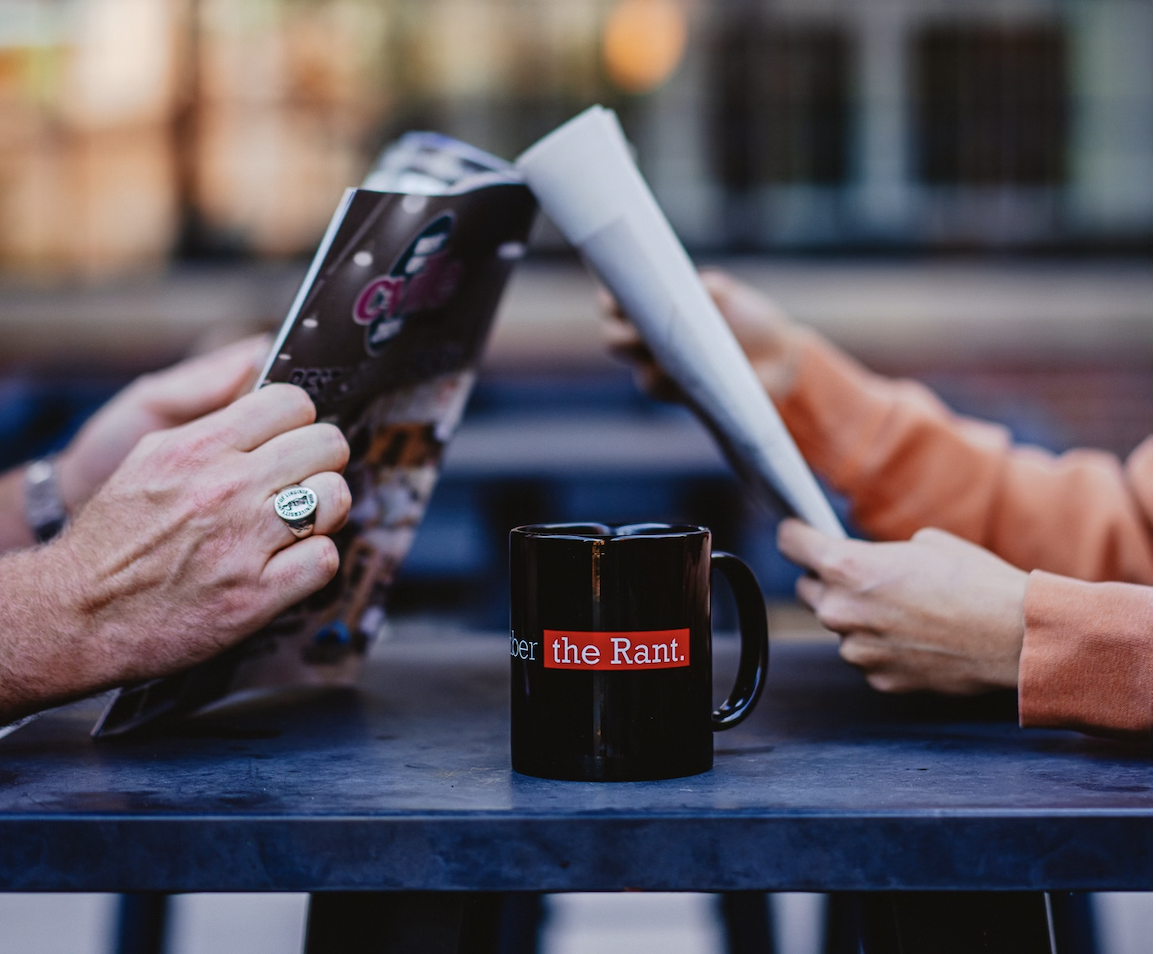Read all about it
An AMA with C-VILLE’s co-owner and founder, Bill Chapman
By Caite Hamilton
Sensing that Charlottesville deserved a smart, irreverent (and free!) news source on the eve of “the roaring ’90s,” as he calls it, C-VILLE’s co-owner, Bill Chapman, founded the city’s only alt-weekly, C-VILLE Review, in September of 1989.
Chapman, co-founder Hawes Spencer, and their small team of writers sought out stories that captured the spirit of the city, from its burgeoning restaurant scene to its soon-to-be-famous musicians (read: Dave Matthews, who was bartending downtown at the time). The newspaper published every other Tuesday until 1995, when it started hitting stands weekly and expanding into news coverage.
In the 35 years since, C-VILLE has become the largest-circulated print product in central Virginia, serving not only Charlottesville, but the surrounding counties of Albemarle, Greene, Nelson, and Madison. On the eve of its 35th birthday, Chapman sat down with me, the paper’s current editor, for a chat.
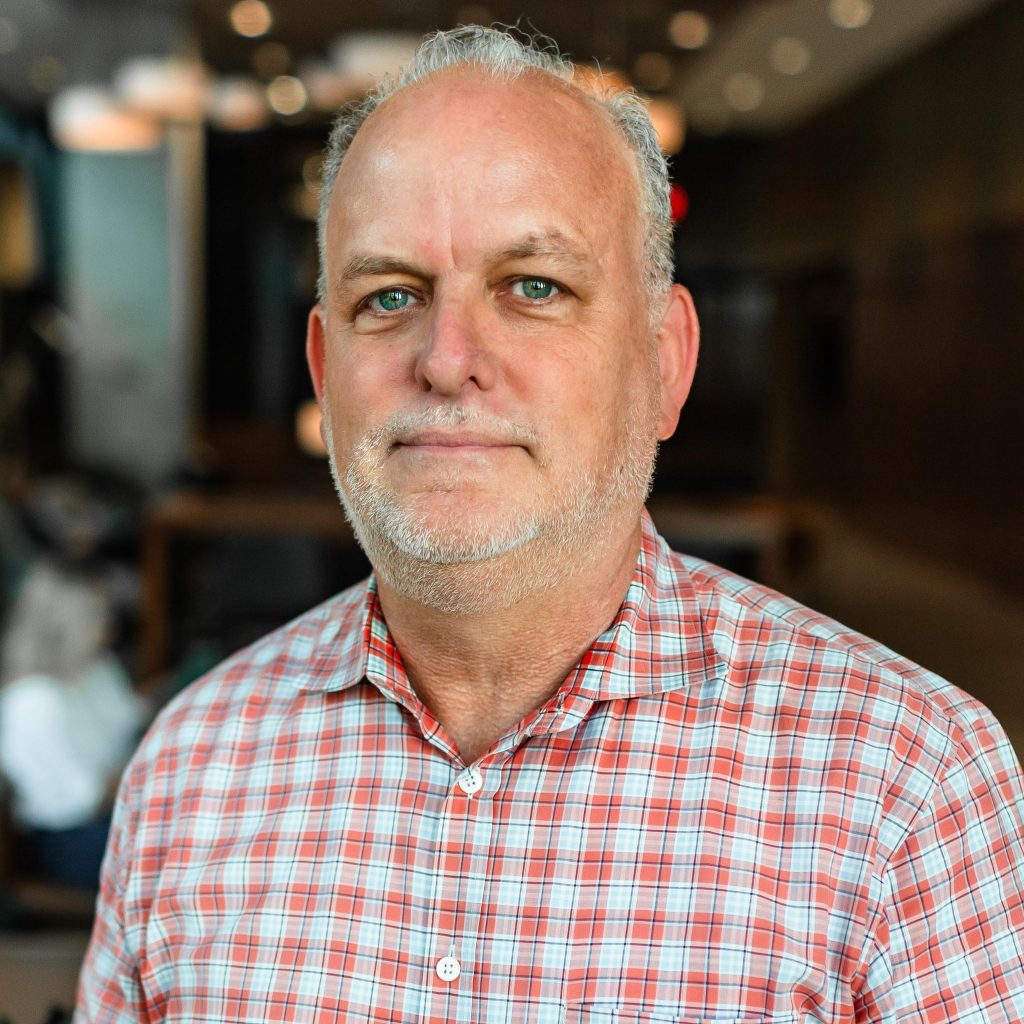
So tell me about C-VILLE’s beginnings.
I was in college when we hatched a plan to launch a newspaper in Charlottesville. I think I was in my final semester of college and I met Hawes Spencer, who was working at [Hampden-Sydney]. He had graduated, but he was working in the public relations office there, as was I. That was the planning phase. We moved to Charlottesville at the same time, moved in together, launched the paper in September [1989] after working on it over the summer.
What were you hoping to provide for the community in starting a paper? I was just thinking about myself, really. I wasn’t really thinking a lot about the community as a 21-year-old. I had done a summer internship, after my junior year, at a free weekly paper in Richmond called Style Weekly, and I thought it was a fun place to work; they gave you your birthday off, [they had a] cool office downtown. I was just thinking about giving myself something to do.
In those early days, who was on staff? Just the two of you? Yup. I was the editor, Hawes was the publisher. Those titles were pretty vague because we did everything. We delivered the paper, we drove it to the printer, sat there while it got printed, drove back, and delivered it around town.
We had this downtown office on Altamont Street in a house. This is pre-internet, so you couldn’t email someone their ad copy. We didn’t have a fax machine either, so if someone wanted to drop off a press release about a concert, they would come to our house. If someone wanted to advertise, they would come to our house.
So you’re getting a lot of weirdos in the door, just handing you pieces of paper that you can then scan— Yep, no scan.
Oh, right. Sorry. I’m just so, so young, I don’t even know a world without scanners. Yeah.
So how long before you hired staff? I took a break from working there after about 18 months, moved up to New York City with my then girlfriend, who later became my wife, and Hawes ran the paper from ’91, ’92, for about four years and he hired some staff. Then I came back and we decided to start publishing weekly. In 1995, we changed the name of the paper, we hired more people, and we got a new business partner, Rob Jiranek.
You’ve told me before that the tone you were hoping to set was “smart” and “irreverent.” Is that because you thought that’s what you personally could provide? You’re a kind of irreverent person. [Hawes and I] were both sarcastic people and it was something that had never been done in print in Charlottesville. The media was pretty reverent toward institutions at the time—like, if UVA sent a press release, you’d write an article about it. You didn’t question it. At the time, there were interesting things going on—like Patricia Kluge being on the Board of Visitors at UVA, and the governor of Virginia, who had appointed her to that position, was allegedly dating her and using the state helicopter to fly up and land in her yard to see her. That’s an example of fodder, like, “Let’s make light of this somehow.” We were [smart and irreverent], but we were just kids making fun of stuff.
These days we take ourselves a little bit more seriously; we’re a little more reverent. What do you think was lost in that shift? There’s a lot more sensitivity required now, just for, let’s call it political reasons, but you have to be sensitive to all sorts of stuff—gender, race, sexuality, housing, poverty—a long list of things that we didn’t know anything about, therefore we didn’t care. And we weren’t deliberate—we weren’t knowing about it and not caring about it. We just weren’t thinking about it. It was happy-go-lucky. I think it’s just harder now to be carefree.
Can you think of a time when you felt like C-VILLE’s value was really obvious? I can think of two: There was kind of a ramp up through the ’90s of the Charlottesville restaurant scene, and we were the only ones that covered restaurants. So we were kind of the chronicle of the growth of downtown and independent dining for a decade or so—or more. We were championing these places that maybe people wouldn’t have known about otherwise.
Another time I can think of is we published a pretty good … summary, I’ll call it, of the August 12 riots. It was a timeline, but I thought it did a good job of memorializing something important in a straightforward way.
Part of this anniversary issue is thinking about the next 35 years, and I’m curious about three things: Do you feel like we’re at a crucial moment? If we’re not, what are some other crucial moments where you felt like, “Uh-oh, we’re in real trouble.” And if we are, how are you hoping we move through it? Back in the ’90s, there was a burst of activity around internet-related businesses. Like Boxerjam. Everyone wanted to work there. Supposedly AOL wanted to acquire them, but they turned that down. It was a lot of excitement. There was another company called Value America that started up here and hired tons of people. All the energy and the talk was going into internet businesses and internet jobs. Being in the newspaper business seemed pretty unexciting and unsexy at that time, so that seemed sort of like a crisis. People were saying to us, “Oh, the internet. [The newspaper] won’t even be around next year, right? It won’t even be around in 1997.” But that blew over. We got through that one. I would say that COVID seemed like a crisis—for every small business, but since we were totally reliant on small businesses to fund what we do and they were all closed, we were kind of powerless. But that also blew over with government aid.
That’s two examples. Are we in a crisis now? I don’t think so. I’m hopeful that C-VILLE can take its history and the brand it’s established and find some new ways to serve Charlottesville. [The weekly is] probably going to stay flat or shrink over time due to obvious factors, but could we do something new with our long history, our knowledge, our energy, our brand?
How do you envision your role at C-VILLE now? I’m a single-digit percentage owner of the business. I have, by definition, much more history than anybody else with the business, so I’m kind of on call for founder/owner/old man consulting on different topics.
Okay, let’s talk about The Hook. What happened there? From what I recall, there were three owners of C-VILLE Weekly: me, Rob, Hawes. We were trying to diversify the company by doing things like starting Blue Ridge Outdoors magazine and investing in a weekly paper in Richmond, which we later closed. We also bought a newspaper in Columbia, South Carolina, [and] later had one in Augusta, Georgia.
But Hawes was just not into any of that. He wanted to focus on C-VILLE Weekly alone. Because of that dynamic, he was becoming more prickly to work with and it became a bad office environment. We were trying to run a business, but we had this bitter person in there. So we fired him as editor. He was still an owner of the company, but we fired him from his editor job and eventually bought his portion of the company.
He went to some other people he knew with publishing experience, like Blair Kelly. Blair was friends with Ted Weschler, who was starting to invest in businesses around town and, between the three of them, they funded The Hook. That ended up lasting like 10 years, but my impression was it had like one good year financially. I think that was during a big real estate boom in 2007; both C-VILLE and The Hook had their peak year in 2007.
Then the 10th year of competing was approaching, and I was like, “This is getting old. Let’s create something bigger by combining forces pulling the same direction.” Blair was interested in business ideas, so he said yes to that. Our initial instinct was to publish both because more publishing pulls more money, kind of like when we came out every week versus every two weeks, it was a better business, so having two weeklies could be better. But by that point, the competition from electronic media had started and advertisers were going digital. I think some of them were actually relieved when we killed The Hook because it simplified their decision-making.
Ironically, when we met, [Hawes and I] were both working as freelance journalists. He was with the Richmond News Leader, which was an afternoon daily paper, and I was with the Richmond Times-Dispatch, which was a morning paper. So there were two dailies in Richmond at the time, both ended up in the same company. And they eventually merged into the Richmond Times-Dispatch, but the News Leader used to be its own daily newspaper that came out in the afternoon. The Daily Progress came out in the afternoon then, too.
Oh, really? They had paper boys who would ride bikes around delivering it. I’m sure you’ve seen that in old movies.
Never heard of ’em. Here’s one last question for you: If you had to do it all over again, would you? Yes. [C-VILLE] is kind of a small institution in town. It’s been around 35 years and I’m proud of that. It doesn’t seem like the environment right now is a good one to be starting a weekly newspaper, so if I think of it that way, no. But it seemed like perfect timing [in 1989] because the free weekly trend was going around the country. It was kind of the original free media, and it was the original removal of the paywall, because you had to pay to read The Daily Progress, and you had to pay to read the Observer [a weekly newspaper in town at the time], and we were free, and no one understood how we were doing that, or why. That’s kind of interesting.
STAFF STORIES
Former C-VILLE employees think about the good ol’ days
John Borgmeyer
THEN Senior Staff Writer, News Editor (1999 to 2006)
NOW Litigation attorney for the Missouri Public Service Commission
What you loved most: All the fun and talented people.
What you found most challenging: Deadlines.
Your most enduring memory of your time at C-VILLE: Working at the “C” house on South Street, the whole thing with The Hook, being part of the team that brought home C-VILLE’s first AAN Awards, walking downtown on Tuesday mornings and seeing everybody read the paper.
Graelyn Brashear
THEN News Editor (2012-2015)
NOW Making podcasts at CNN
What you loved most: Sharing a masthead with the rest of the team. I know now that it’s actually kind of rare to love your co-workers as much as I did (still do). I also had remarkable freedom to report out stories I really cared about that ended up making a difference, and that is no small thing.
What you found most challenging: Being a part of a tiny team with a remit to cover a town that has a complicated relationship with its own history, tends to thrust itself on the national stage at regular intervals, and has a real thing for complex infrastructure issues was fun, and it was also exhausting. Relatedly: Print reporters are underpaid!
Your most enduring memory of your time at C-VILLE: Sun, rain, snow, or derecho, some or all of the editorial staff was always up for a walk down the Mall to Mudhouse, talking stories, talking shit, and talking to people we knew. It’s how I remember the moments and the years—in paper cups of very good black coffee. That and the time with the [redacted] and the [redacted], but Caite’s not going to let that go to print.
Harding Coughter
THEN Senior Graphic Designer
(2014-2016)
NOW Senior art director at a creative advertising agency in New York City
What you loved most: I loved learning from my co-workers. Whether it was about Charlottesville’s history, a new lunch spot, or the latest band coming to town, I was always picking up something new. From reading the paper every Wednesday morning or taking Mall laps, I felt like I was constantly discovering more about my hometown.
What you found most challenging: The most challenging part about working at C-VILLE were my responsibilities. I was fresh out of college and in charge of sending the final paper to the printer (of course we had a team but I pressed that dang button). I give a lot of thanks to C-VILLE for teaching me how to handle expectations and starting my career in such a positive way.
Steve Delgado
THEN President and Group Publisher (2002-2010)
NOW Chief operating officer at Homeboy Industries, a large
nonprofit organization in my hometown of Los Angeles.
What you most loved most: It’s always about the people, and C-VILLE has always had the most talented and fun colleagues. That talent manifests in the publication every week.
Your most enduring memory of your time at C-VILLE: Some pretty good Best of C-VILLE parties.
Elizabeth Derby
THEN Editorial Assistant, Arts Section; columnist for The Works (2013-2020)
NOW Business coach and consultant
What you loved most: The creative team! You couldn’t ask to work with a more fun, friendly,
and dedicated crew. We made a lot of wonderful memories.
I also loved that I got to discover and explore the weird, wonderful little pockets of artists, writers, and creative projects of Charlottesville and surrounding counties.
Your most enduring memory of your time at C-VILLE: Going full sequins and ’80s fabulous to dance the night away at Best of C-VILLE.
Frank Dubec
THEN Advertising Account Executive, Classified Advertising Manager, Advertising Director, Publisher, Group Publisher & Vice President of Business Development (2001-2013)
NOW Renewable energy
What you loved most: C-VILLE was the creative tastemaker in
Charlottesville for a long time. It was the beacon for this town,
the center of creative thought, it held up a mirror to Charlottesville. It really created conversations and, in some ways, helped Charlottesville see itself more clearly. As a workplace, it was where
the youthful, smart, edgy, and the aspiring media folks went to create impactful work.
What you found most challenging: The media landscape changed, became far more fragmented, it became a lot more difficult to maintain readers’ lagging attention spans and the ad revenue needed to continue growing and building fun things. Charlottesville continued to change, too. Locals became less connected; Charlottesville felt different, less of the small town it had been. You don’t hear people say “C’ville” (short for Charlottesville) much anymore.
Your most enduring memory of your time at C-VILLE: That answercould be an entire issue. I owe a lot to some incredible co-workers, employees, and mentors for teaching me things that
I use every day. Also, Best of C-VILLE Parties created indelible memories and scars. Has anybody seen a tutu since?
Brielle Entzminger
THEN News Reporter (2019-2023)
NOW Communications strategist for UVA’s Miller Center of Public Affairs
What you loved most: Building relationships with a variety of local residents and serving the community with my reporting. I worked to highlight issues particularly impacting Charlottesville’s marginalized communities and underscore the critical reforms and resources these communities advocate for.
What you found most challenging: Meeting tight deadlines and not exceeding word count (I usually failed at the latter)!
Your most enduring memory of your time at C-VILLE: Reporting on the abhorrent health and sanitary conditions at the Albemarle-Charlottesville Regional Jail.
Jen Fariello
THEN Photography Director (1996-2001)
NOW Fine art and portrait photography
What you loved most: I loved getting the inside scoop on what was happening in the city and the all-access press pass. I could say I was the C-VILLE Weekly photographer and get into just about everything.
What you found most challenging: The time commitment. I worked there at the same time I was building my photography business and The Downtown Artspace.
Your most enduring memory of your time at C-VILLE: Meeting my husband was certainly a big one; he was the advertising designer at the time we met. My favorite memories are doing cover shoots with Courteney Stuart and helping on a shoot with Playboy for The Girls of the ACC. They had called the office and asked for a location scout and the task was given to me.
Brendan Fitzgerald
THEN Intern, Arts Editor, News Editor (2006-2012)
NOW Writing and editing stories, some of them about Virginia.
What you loved most: I loved creating something big and complex on a weekly basis, hustling alongside colleagues to build something that felt critical but also artful. I loved them, too—the architecture critic who was a homesteader, the news editor turned public policy professor, the reporter who wrote poetry, the art director who came in every Saturday with his dog.
What you found most challenging: Silence from powerful figures and institutions. Moments of violence that sharpened the city’s inequities. Running up against someone’s worst assumptions of your work. The impossibility of countering faith with facts.
Your most enduring memory of your time at C-VILLE: A year into my time at C-VILLE, I decided to apply to journalism schools. I ordered my transcripts, drove to Lynchburg to take the GRE, and finally asked Cathy Harding for a letter of recommendation to Berkeley, which she turned around fast. After I was accepted, I told Cathy that I felt torn between the job I had and this new possibility. “I’d hate for you to go into debt to learn how to do a job you’re doing, then re-apply to get your old job back,” she told me.
My time at C-VILLE doesn’t easily organize itself into “Best Of” lists. No memory comes out on top. But I never regretted staying at the paper. Journalism school might have offered me tacit permission to tell stories I hoped would feel, somehow, bigger. Working at C-VILLE taught me the value of granting myself that same permission.
William Goldsmith
THEN Freelancer, staff writer, news editor, interim managing editor (2005-2011)
NOW Teaching public policy at the University of North Carolina at Chapel Hill
What you loved most: An omnipresent excuse to poke my nose in the affairs of that vibrant town: to spend uncounted hours jawboning with local leaders, to hang out at the General Assembly, to ride around the old 5th Congressional District with former Congressman Tom Perriello, to stumble around neighborhoods from Fifeville to Greenbrier, to drink beer and watch UVA sports, and somehow to call it all work.
Your most enduring memory of your time at C-VILLE: The tense Monday mornings with my beloved colleagues as we finalized that week’s edition for the printer. But honorable mention to several amazing Best of C-VILLE parties.
Ben Hitchcock
THEN News Reporter, Editor in Chief (2020-2022)
NOW Organizer on the Kamala Harris campaign in New Hampshire
What you loved most: I grew up in Charlottesville and I went to UVA, so I thought I knew everything about this town—and then I started working at C-VILLE, and every single day I learned something new about my home.
What you found most challenging: I became the editor of C-VILLE during a turbulent period in the paper’s history. In the summer of 2020, as COVID hammered small businesses around the country, C-VILLE laid off 40 percent of the editorial team … and promoted me, then a 23-year-old with six months of professional journalism experience, to be the editor in chief.
In my first few weeks on the job, we had to tackle big stories like the spread of the pandemic and the effects of the historic racial justice protests across the region. I had to learn how to be a newspaper editor on the fly with a staff that was stretched thin.
Erika Howsare
THEN Special Sections Editor
(2006-2010)
NOW Freelancing (a little!) for C-VILLE, and I published my first nonfiction book this year—The Age of Deer: Trouble and Kinship with Our Wild Neighbors. I’m also teaching and mentoring other writers.
What you found most challenging: When I was on staff I was multitasking to the nth degree. It got zany. In one day I might call a restaurant owner to ask about their new menu before editing a freelancer’s column about the real estate market and then visiting the jail to do some reporting about recidivism and zipping over to Barracks Road to pick up a $300 pair of shoes for a photo shoot. Truthfully, I loved the crazy variety. On a good day I’d also get to walk over to Second Street Gallery to look at some art and write a review.
Your most enduring memory of your time at C-VILLE: One time, about 2008 or so, a community member brought us a really offensive mass-mailing letter he’d received from then-Congressman Virgil Goode, trying to rile up his base with Islamophobic nonsense. The news editor at the time, Will Goldsmith, asked me to write a short piece about this and we decided to publish the letter in its entirety—it really spoke for itself. All I had to do was write a little intro and add a headline, of which I am still proud: “Goode makes complete ass of self.”
Laura Ingles
THEN News Reporter, Living Section Editor (2012-2017)
NOW News and editorial manager at VCU School of Medicine
What you found most challenging: Getting the occasional call from sources who weren’t happy with the way they came across in a story. There’s no tactful way to say, “If you don’t want to look dumb in the paper, don’t say dumb things to a reporter.”
Your most enduring memory of your time at C-VILLE: Oh man, so many. My first big, breaking story was when the president of UVA was ousted during the summer of 2012, and it was all Graelyn and I covered for weeks. On the night of the big Board of Visitors meeting when they voted to reinstate her, we camped out on the floor of the Rotunda with all our counterparts from news outlets around Virginia, and after we all filed our stories, everyone ended up crowded into a couple booths at the Virginian on the Corner. The journalism culture in Charlottesville was so supportive and congenial, and I felt really lucky to be a part of it. I also have fond memories of hunkering down in the newsroom with Graelyn on election night in 2012. We had a pizza, in classic newsroom form (and, inexplicably, takeout from Guadalajara?) and did our best to provide local coverage of a massive national story.
Rachael Kesler
THEN Account Executive (2009-2010), freelance writer
NOW Marketing consultant for RKP Marketing Communications
What you loved most: We had an awesome team and a great boss (Frank Dubec), so we always had a ton of fun during work hours. That fun usually extended beyond working hours with the crew of folks I worked with then. I’m still friends with many of them.
Lian LaRussa
THEN Graphic Designer (2004-2013)
NOW Living in the Midwest and working remotely as a Senior UX Web Designer for a digital consultancy
What you loved most: I got to meet and work with some really fun and smart people. Free event tickets were always a bonus. All the restaurant news and openings. Getting to read C-VILLE Weekly before it came out. Learning from a talented art director. Being on the Downtown Mall all day. Meeting local business owners.
What you found most challenging: Getting PDFs from advertisers that didn’t have 4-color black text (IYKYK).
Lisa Provence
THEN Freelance Reporter (1997-2001), News Editor (2014-2019)
NOW Gainfully retired
What you loved most: The ability to write the stories that most interested me. And getting to work with people who care passionately about the news, like Hawes Spencer and Courteney Stuart.
What you found most challenging: The low pay means taking a vow of poverty to work in local news.
Your most enduring memory of your time at C-VILLE: Covering the Unite the Right rally in 2017 and subsequently joining a group of about 100 Charlottesvillians on a pilgrimage to the Equal Justice Initiative’s lynching memorial in 2018.
John Ruscher
THEN Online Editor/Music Columnist (2007-2008)
NOW Living in Seattle, Washington, and raising a little girl
What you loved most: Picking up the latest issue for the first time and seeing everyone’s hard work in print.
What you found most challenging: Getting to work on time in the morning after late nights attending multiple concerts.
Your most enduring memory of your time at C-VILLE: Going on the road Almost Famous-style with Sparky’s Flaw (who later changed their name to Parachute) for a cover story.
Courteney Stuart
THEN Deputy Editor (1998-2002), Senior Reporter, Editor in Chief (2013-2015)
NOW Director of reporting for true crime production company Audiochuck
What you loved most: C-VILLE was my first full-time journalism job and it’s where I became certain that I would always be a journalist. I loved learning about every aspect of the city while working alongside colleagues who became some of my very best friends. Working at C-VILLE gave me the opportunity to meet so many people and to engage with the community in a deep and enduring way.
What you found most challenging: As editor, it was hard to not be out in the field reporting, especially in 2014 when Hannah Graham was abducted and murdered and Jesse Matthew was finally apprehended.
Nicole Thisdell
THEN Editorial Assistant, Copy Editor, Receptionist (1995-1999)
NOW I opened a store, JunkHaven, on Afton Mountain in a garage built in the 1930s.
What you loved most: I loved the fast pace, demanding deadlines, and knowing everything that was going on around town.
What you found most challenging: Catching every single phone call and fielding all the feedback.
Your most enduring memory of your time at C-VILLE: I had a chance to interview Rob Sheffield, who worked for Rolling Stone. We met at Miller’s and he asked me for a ride home after. When I turned the ignition on my VW Scirocco, the broken radio always turned on, too, and it blasted Scritti Politti. I was so embarrassed until he said, “Scritti Politti?” And he knew several facts about the band. I think he may have mentioned that conversation in his Rolling Stone review of the 1999 Scritti comeback album.
Travis Wilburn
THEN Head of Business Development (2008-2011)
NOW Tourism and hospitality
What you found most challenging: The community that embraced [the newspaper]. We live in a passionate community with strong opinions which is a strong sign of a healthy community.
Your most enduring memory of your time at C-VILLE: The Best of C-VILLE party 2010, opening the renovated ice park with dancing choreographed circus theme entertainment and seeing 1500 people all in the same room.
Who, what, wear
It may be our 35th, but we’re rocking one of these—from C-VILLE’s new line of merch—in lieu of a birthday suit this year. Click here to get your own, and wear your love for your local paper on your sleeve (or your tote bag, or your coffee mug, or…).
